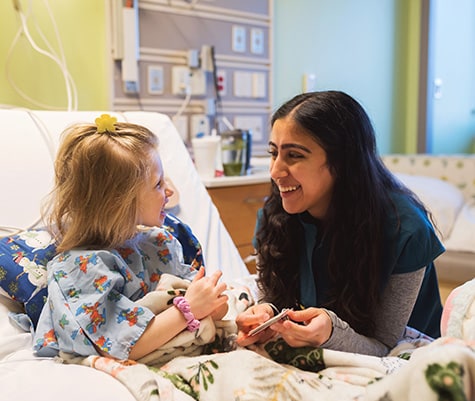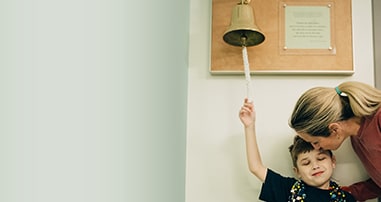For children fighting high-risk, recurrent or hard-to-treat neuroblastoma or pheochromocytoma, treatment options can be limited. I-131 MIBG therapy can offer hope.
MIBG is a treatment that uses radio-labeled iodine molecules (I-131) attached to a compound called metaiodobenzylguanidine (MIBG). MIBG specifically targets tumors like neuroblastoma and pheochromocytoma. It is taken up by these tumors and delivers a higher dose of radiation directly to the tumor while preserving adjacent normal tissue.
At the Aflac Cancer and Blood Disorders Center of Children’s Healthcare of Atlanta, our goal is to provide a safe, comforting place for healing. After a child receives MIBG treatment, he will be radioactive for up to seven days. He must stay in a special room to minimize contact with parents and siblings and to avoid contact with other patients.
We understand how important it is to be close to your child while he is in the hospital. That’s why we specially designed a separate room for parents that is adjacent to the child’s room.
The two rooms are equipped with a closed-circuit TV system that allows parents and their child to stay connected at all times. Families can see, talk, watch movies and play video games together using our specialized TV system. Parents can still go into their child’s room, but this unique parent-room setup helps decrease radiation exposure to the family.
Additional features of our MIBG facility include:
- Lead-lined walls to prevent unnecessary exposure to radiation.
- Clear shields to protect family members, doctors and nurses from radiation while still allowing them to see the child.
- Paper and plastic coverings on all walls, flooring and other surfaces.
Receiving a cancer diagnosis for your child can be an emotional and overwhelming experience. At the Aflac Cancer and Blood Disorders Center, we are here to support you and your family. Whether treating a toddler during an emergency or helping a teen through chemotherapy treatments, we make it our mission to provide the best care—and best experience—for every child. Family is a big part of your child’s well-being. Not only are you a vital member of the healthcare team; you are a source of security and comfort.

We work to support your whole family while your child is in our care—and after she goes home.
The Future of Pediatric Cancer and Blood Disorders Care
Contact Us 404-785-1112




